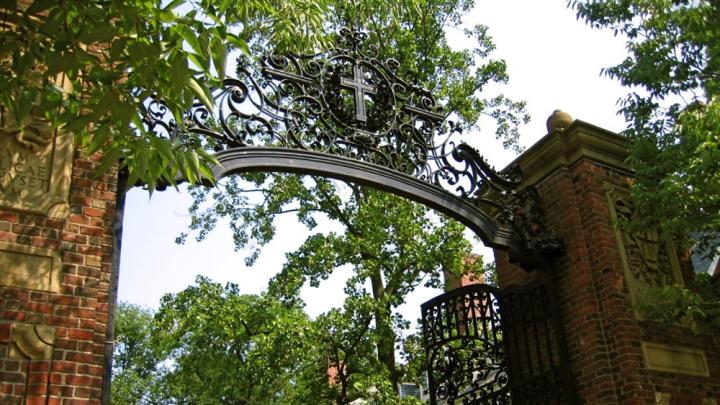When Harvard announced that the time had come to retire the final line of the alma mater—“Till the stock of the Puritans die”—a Rube Goldberg marvel of institutional machinery was kicked into gear. The Presidential Task Force on Inclusion and Belonging received 168 text submissions, which they screened for being “minimally viable with regard to rhyme, rhythm and sense.” Then a subcommittee came up with a longlist of 20, inviting comment from the University community via the new online “Solution Space.” Then a five-judge panel of alumni and faculty—including professor of English Steph Burt and Franklin Leonard ’00—winnowed them down to three finalists. Then the task force and the Office of the President and the Provost conferred over the final choice.
But for Janet Pascal ’84, who came up with the winning line—“Till the stars in the firmament die”—the process was simple and essentially casual. She was already familiar with the song’s rhythms: in college, a friend enamored of “the literary ideal of school spirit” insisted that they memorize the first and second verses.
“I don’t know if you’ve read the entire thing,” she says, with a confidential air, during a recent phone conversation. “It’s pretty lousy poetry.”
When another friend forwarded her the contest announcement, she recalls, “I’ve always written little poems and things, and I thought, why not?” Pascal is an executive production editor at Viking Children’s Books, and herself a children’s book author. Through this work, she says, “I think I have a good sense of rhythm. And what I was trying to do with the new line was keep the aural sensation as close as possible.”
Ultimately, Pascal’s solution defeated “Till the shadows of ignorance die” and “Till the end of the ages draws nigh” to land, victorious, on Harvard’s website and the creamy pages of every event program this week. “Well, I can tell people I'm now a footnote in the Harvard alma mater. That's pretty cool,” says Pascal. “It’s not exactly momentous or earth-shaking.” But still: “I’m pleased they thought to change it.”
When she was at the College, the hymn still opened with, “Thy sons to thy jubilee throng”—“which was more overtly inappropriate,” she says. “We're not all Puritans, but we're DEFINITELY not all sons.”
Pascal happens to love choral music. Though as a student she never tried out for the various school singing groups, she discovered the activity through her first boss, at the University Press of New England.
“Oh, boy, it’s hard to explain how wonderful choral singing is,” she says now. It’s something in the way a group of people collectively synchronizes. “You’re part of a bigger group, and you lose yourself in it.”
With her thirty-fifth reunion on the horizon, she’s considering coming back to campus to hear her revision performed. “I do find it very moving when a whole, huge crowd is singing the same thing.”








